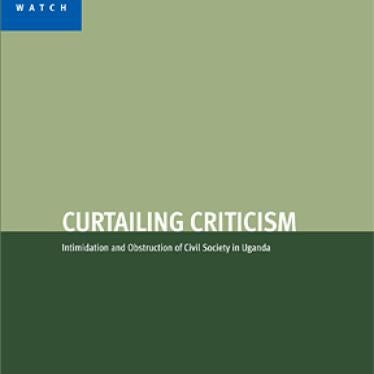I’ve interviewed hundreds of victims and witnesses of human rights abuses in Uganda, but I was genuinely surprised at the fear I heard recently when I met with activists in the country. “If you preach human rights, you are anti-development, an economic saboteur,” a colleague told me. “You aren’t going to talk about land, oil, and good governance. This is just the beginning, but the tensions have been accumulating.”
Uganda has made the news in recent months over issues like the Ebola virus, Joseph Kony, and the notorious anti-homosexuality law known as the “kill the gays bill.” Less-well-known has been its longstanding patterns of torture and mistreatment of detainees by security forces.
President Yoweri Museveni and the ruling National Resistance Movement have been in power for more than 25 years, with a 2005 constitutional amendment lifting presidential term limits and permitting him to run and win in 2006, and then again, heavily assisted by off-budget spending from state coffers, in 2011.
Since 2011, Museveni has faced increasing criticism for economic woes, corruption, unemployment, rising HIV rates and deteriorating health and education services. In April 2011, demonstrators “walked to work” to protest raising food and fuel prices. The military and police took to the streets, using live ammunition and killing at least nine bystanders and beating journalists documenting the events. The government has routinely blocked demonstrations in the last few years, contending that they threaten public safety.
The president appears to be preparing to run again in 2016 – which would be his 30th year in office – and it seems no coincidence that in the wake of growing public grievances, the ruling party’s officials are scrutinizing nongovernmental organizations and the impact they have on public perceptions of governance and management of public funds.
Organizations working on human rights, land acquisitions, oil revenue transparency, and other sensitive issues are the main targets, and apparently viewed as a threat to the administration’s interests. Uganda’s laws reflect this analysis. The intelligence agencies are legally mandated to monitor civil society, and the president’s office has a role in reviewing requests to do research, via the Uganda Council on Science and Technology.
Over the last two years, Ugandan officials have reportedly closed civil society meetings and workshops, reprimanded organizations for their research, demanded retractions or apologies, and confiscated t-shirts, calendars and training materials with messaging about political change and “people’s power.” The government board mandated to regulate civil society recently recommended dissolving one group unless it apologized for bringing “the person of the president into disrepute” and has stated that working in coalitions is unlawful.
At the same time the government’s hostility to, and harassment of, Uganda’s lesbian, gay, bisexual, and transgender (LGBT) community continues unabated. Government officials demonize homosexuality, deliberately misinform the public, and stir hatred. One minister uses “the promotion of homosexuality” – a spurious claim – as justification for his campaign against any group seeking to protect the rights of LGBT people. He told me that the pursuit of LGBT rights is a Western conspiracy aimed at destroying Uganda.
While homosexual sex is illegal in Uganda, it is not illegal to discuss LGBT issues, despite the deeply misguided anti-gay bill still pending before parliament. Groups focused on fighting for the rights of LGBT people therefore have every legal right to register and operate. But in practice, that remains far from possible. While many interpret the government’s increasing focus on homosexuality as a populist strategy to gain support, it is still profoundly dangerous for a community that is vulnerable to harassment and violence.
Donors need to ask tough questions about where Uganda is heading, given the deteriorating situation for civil society. Furthermore, in today’s Uganda, government institutions have little independence to perform their constitutionally mandated jobs, corruption is rife, and protecting the ruling party and the president from criticism has become more important than citizens’ right to information. Fundamental democratic guarantees such as freedom of expression and association should not take a back seat to security interests. Ultimately, this is the lesson of the Arab spring.
Until Ugandan civil society is free to research, publish, speak out, debate and advocate for change without fear, durable security will remain out of reach.
Maria Burnett is a senior Africa researcher at Human Rights Watch.







